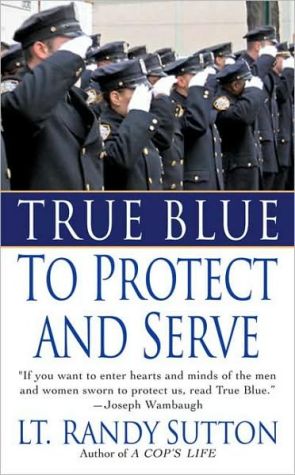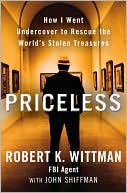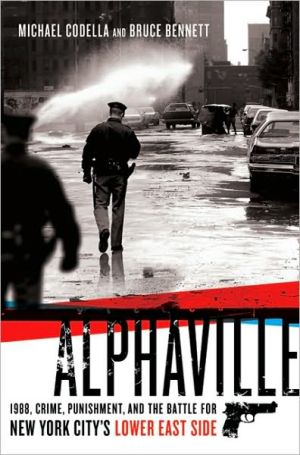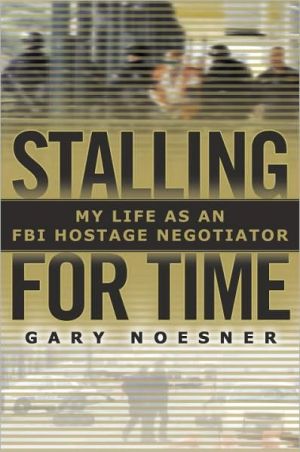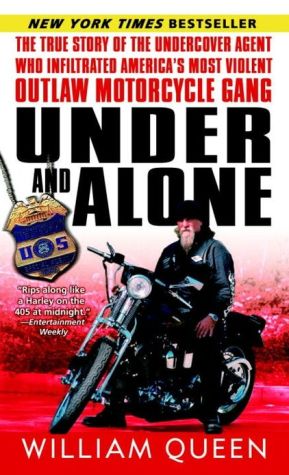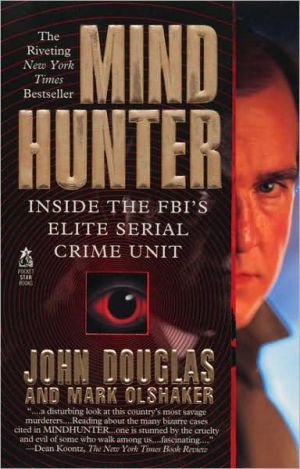True Blue: To Protect and Serve
Lieutenant Randy Sutton’s fascinating collection of stories and memories, solicited from law enforcement officers across the country, offers a broad and insightful look at the many facets of police life: courage, exhilaration, frustration, loss, and even humor—from the everyday to the career-defining moments on the job. Told by the cops who lived them, the stories in True Blue show what it truly means to protect and serve.\ Readers will come to recognize the faces behind the badge, as they...
Search in google:
Lieutenant Randy Sutton’s fascinating collection of stories and memories, solicited from law enforcement officers across the country, offers a broad and insightful look at the many facets of police life: courage, exhilaration, frustration, loss, and even humor—from the everyday to the career-defining moments on the job. Told by the cops who lived them, the stories in True Blue show what it truly means to protect and serve.“[Sutton] brings to vivid reality the real stories of cops whose guts and glory are seldom seen and rarely heard.”—John Langley, creator of COPSReaders will come to recognize the faces behind the badge, as they witness officers charge into the unknown on The Beat, honor and mourn friends in The Fallen, hear the War Stories spread in police locker rooms and bars, discover the unbreakable line between civilian and cop in the Line of Duty, and feel the blood-boiling adrenaline during those life-altering moments when a cop must use Deadly Force. “They all come right from the heart that beats beneath the badge.”—New York Daily News on True Blue (vol. I)A portion of the royalties for this book will be donated to The National Law Enforcement Officers Memorial Fund.
True Blue: To Protect and Serve\ \ By Sutton, Randy \ St. Martin's Paperbacks\ Copyright © 2009 Sutton, Randy\ All right reserved.\ ISBN: 9780312549725 \ \ \ Chapter One \ The Fallen\ A Senseless Act\ By Randy Sutton\ Lieutenant, Las Vegas Metropolitan PD, twenty- two years; Princeton Borough PD, New Jersey, ten years.\ The man who killed Sergeant Henry Prendes did not hate him. He couldn’t have; they had never met prior to the moment the killer dumped three 7.62mm bullets into his chest, leaving Sergeant Prendes lying mortally wounded on the cold concrete walk leading up to a nondescript family home in suburban southwest Las Vegas. "Why?" is always the question in the depressing aftermath. The reply we’ve come to expect answers nothing at all: "It was a senseless act." Can we make sense out of something meaningless? Maybe for the sake of Sergeant Prendes’s memory we should try.\ 2:20 P.M.: I had been having coffee with an old friend, another cop from a neighboring department, when his cell phone rang. He listened for a moment and then his eyes sought mine; I caught the briefest hint of despair before his expression hardened and his jaw set. I felt the clenching in my gut as I set my coffee cup back down on the table and waited for him to finish the call.\ "Sorry, brother, there’s been a shooting," he said. "It’s one of yours."\ "How bad? Dead?"\ He nodded. "Another officer wounded. He’s en route tothe hospital."\ "The suspect?"\ "Your guys returned fire at the scene. Put him down." My friend’s gaze turned steely, but his knuckles were white where he gripped his coffee mug. "That takes care of that complication."\ We seemed frozen there for those few seconds, each staring down at the table, distracted, enveloped in the normalcy and fragrant warmth of the small diner. I looked around; everyone was enjoying their meal, their afternoon, their life. In here you could almost imagine that nothing bad ever happened. But it had.\ "I’ve got to get over to the hospital," I said, standing up. He nodded and grabbed his coat. I threw down a twenty- dollar tip for our two cups of coffee; maybe it was guilt money for sitting snug in a diner while one of my own paid the ultimate price for doing his job.\ We both stood up and walked outside; he stood at his patrol car door and I stood at mine. I knew what he was waiting for. There are almost four thousand cops in my department, and though I don’t know at least half of them, the question had to be asked.\ "Did you know who it was?"\ "They said it was Sergeant Henry Prendes. You know him?"\ A chill swept through me, and my chest and jaw grew tight.\ "Yeah, I did."\ Our eyes met and held for a moment in the manner of old warriors, and then we went our separate ways.\ One hour earlier: 8336 Feather Duster Way. It was a domestic violence call. Several neighbors had called 911 to report that a man was beating a woman in the front yard with a stick. The woman, they said, was his girlfriend. A few minutes later the girlfriend called in.\ Girlfriend (screams): He just broke my car window!\ 911 operator: I can’t hear you. What?\ Chapter One\ THE FALLEN\ A SENSELESS ACT\ BY RANDY SUTTON\ Lieutenant, Las Vegas Metropolitan PD, twenty- two years; Princeton Borough PD, New Jersey, ten years.\ The man who killed Sergeant Henry Prendes did not hate him. He couldn’t have; they had never met prior to the moment the killer dumped three 7.62mm bullets into his chest, leaving Sergeant Prendes lying mortally wounded on the cold concrete walk leading up to a nondescript family home in suburban southwest Las Vegas. "Why?" is always the question in the depressing aftermath. The reply we’ve come to expect answers nothing at all: "It was a senseless act." Can we make sense out of something meaningless? Maybe for the sake of Sergeant Prendes’s memory we should try.\ 2:20 P.M.: A DINER ON CHARLESTON BOULEVARD. I had been having coffee with an old friend, another cop from a neighboring department, when his cell phone rang. He listened for a moment and then his eyes sought mine; I caught the briefest hint of despair before his expression hardened and his jaw set. I felt the clenching in my gut as I set my coffee cup back down on the table and waited for him to finish the call.\ "Sorry, brother, there’s been a shooting," he said. "It’s one of yours."\ "How bad? Dead?"\ He nodded. "Another officer wounded. He’s en route to the hospital."\ "The suspect?"\ "Your guys returned fire at the scene. Put him down." My friend’s gaze turned steely, but his knuckles were white where he gripped his coffee mug. "That takes care of that complication."\ We seemed frozen there for those few seconds, each staring down at the table, distracted, enveloped in the normalcy and fragrant warmth of the small diner. I looked around; everyone was enjoying their meal, their afternoon, their life. In here you could almost imagine that nothing bad ever happened. But it had.\ "I’ve got to get over to the hospital," I said, standing up. He nodded and grabbed his coat. I threw down a twenty- dollar tip for our two cups of coffee; maybe it was guilt money for sitting snug in a diner while one of my own paid the ultimate price for doing his job.\ We both stood up and walked outside; he stood at his patrol car door and I stood at mine. I knew what he was waiting for. There are almost four thousand cops in my department, and though I don’t know at least half of them, the question had to be asked.\ "Did you know who it was?"\ "They said it was Sergeant Henry Prendes. You know him?"\ A chill swept through me, and my chest and jaw grew tight.\ "Yeah, I did."\ Our eyes met and held for a moment in the manner of old warriors, and then we went our separate ways.\ ONE HOUR EARLIER: 8336 FEATHER DUSTER way. It was a domestic violence call. Several neighbors had called 911 to report that a man was beating a woman in the front yard with a stick. The woman, they said, was his girlfriend. A few minutes later the girlfriend called in.\ GIRLFRIEND (screams): He just broke my car window!\ 911 operator: I can’t hear you. What?\ GIRLFRIEND (sobbing and screaming): Oh! He just broke\ my car window—\ 911 operator: Are you injured?\ GIRLFRIEND: Come quick! He’s got a gun!\ Sergeant Prendes arrived at the residence, three backup units close behind. He was met in the front yard by the tearful girlfriend, her mother, and her brother. The suspect, they told him, a young man in his twenties whom newspapers later described as "an aspiring rap artist," had retreated inside the house. The front door had been left wide open. The officers approached cautiously, by the book. But they hadn’t even gotten halfway up the walk when the suspect, deep inside the shadows of the open doorway, opened fire with a high- powered knock- off assault rifle, striking Prendes point- blank. He reeled backward, shouting "I’m hit!" before he collapsed. Under the barrage of automatic weapon gunfire, the other officers were forced to take cover behind an old Volvo at the curb in order to return fire, but not before the gunman had fired three rounds, execution- style, into Sergeant Prendes’s head.\ The suspect, it seemed to everyone at the scene, had gone mad. He ran upstairs and continued firing down at the officers out of the windows, firing, reloading, firing and reloading: forty- two deadly rounds. The cops returned fire, sixty- three rounds, but the gunman had an advantage with his shielded position.\ Bystanders, screaming, scattered and tried to take cover. One officer threw himself over a prone bystander even as the bullets tore into the ground around him. No one there thought, or would let themselves believe, that Prendes was dead. Rescuing the wounded officer was foremost in their minds, more than subduing the gunman or getting out of this alive. They decided, to a man, to rush the house.\ TWO HOURS LATER, UNIVERSITY MEDICAL CENTER, TRAUMA CENTER. I stood among almost a hundred other cops, some in uniform, others in street clothes, outside of the trauma center. We milled around numbly, sometimes shaking hands, sometimes hugging each other, all united by a feeling of disbelief and unreserved sorrow. For hours cops kept arriving to stand with one another, drinking in not just the sorrow but warming themselves through the sense of unity such tragedy brings. Now and then bursts of laughter could be heard as those who had known Henry related funny anecdotes about something he had said or done, making him alive again, if only for that moment. Sergeant Prendes was one of the few officers who were Las Vegas natives, a hometown boy who’d been the captain of his high school football team. He was a family man, married, with two teenage daughters, and very active in his church. He was an avid golfer, an outdoorsman, a Dallas Cowboy fan, a joke teller with an irrepressible sense of humor. We all knew him as a fourteen- year police veteran and a good cop. He was just thirty- seven years old.\ In the growing crowd I came upon one of the officers who had been at the scene. His pants were torn at the knees where he had dropped down into a kneeling shooting stance. The acrid smell of gunsmoke wafted from his shirt.\ "What finally happened?" I asked him. He told me.\ Every cop at the scene of this raging gun battle knew that their ballistic vests would not protect them from the power of an assault weapon, the unrelenting fusillade such a lethal weapon let loose. Each man knew that the next moment might very well be his last. But their comrade, their fellow officer, was lying on his back in plain sight, a pool of dark blood spreading across the walkway beneath him. They prepared to advance, to break cover. Then, like a scene out of an old Western movie, a plainclothes officer with the Gang Crimes unit arrived. He was armed with an assault rifle, an AR- 15. He started firing almost before he got out of his car, and he kept firing even after he was shot in the leg. The tide turned. The suspect was ballistically overpowered; the six cops on the scene advanced; and the suspect ran down the stairs and into the front yard, spraying the neighborhood with lethal rounds. But the wounded officer shot him, staggering him. Despite his wounds, the suspect stood and continued his assault. Another officer armed with a 12- gauge broke cover and calmly marched toward the gunman, firing blast after blast until he was out of ammo, then reloaded on the move, continuing his march into the sights of the gunman. Other officers were firing from their positions, and suddenly the gunman fell, his body coming to rest just a few feet from the motionless body of Sergeant Henry Prendes.\ The cop now standing in front of me told me he ran to his fallen friend and pulled him to safety, out of the kill zone, in case there was a second armed suspect. But there was no other gunman and Prendes was already dead.\ It was over as suddenly as it began. Pungent gunsmoke filled the air. Nothing but absolute silence until one of the bystanders started whimpering and one of the cops shouted, "Is anyone else hit?" Then, of course, a chorus of approaching sirens.\ The cop stopped the story there and looked away, shrugged. I didn’t know what to say. One of the bosses came out of the trauma center to let us know that the wounded officer, the Gang Crimes Bureau officer, was going to be okay. There was scattered applause at this, some good news in a bleak day. I turned to my companion, but he was already headed back to his patrol car, his gait unnaturally stiff. I called after him but he didn’t turn around.\ I was scheduled to work the graveyard shift that night. I arrived early at my area command to find most of the cops in my shift already there, glued to the TV in the briefing room, where news coverage of the shoot- out continued unabated. Sergeant Prendes was the first cop in our department murdered in the line of duty in nearly two decades, which was just a few years less than most of these young officers had been alive. This was their first experience with the shooting death of a fellow officer, and the tension, an almost physical entity, enveloped me as I walked through the door. Some of the younger cops muttered oaths each time a reference was made to the killer or his "aspirations." But it was the older cops who caught my attention. They simply stood or sat, their posture rigid, their eyes downcast whenever mention was made of Sergeant Prendes. The young ones felt the anger; the older ones felt the sense of loss.\ The undersheriff stood with our captain at the front of the briefing room. Though each had experienced this type of tragedy before, the strain was evident on their somber faces. I thought, for the first time, that the undersheriff looked older than his years. The two did their best to calm the young ones, to bring a sense of normalcy to the briefing, but when the cops filed out to their patrol cars, they were seething with an anger and a grief they couldn’t put words to. My friend from the diner and I had once tried to dissect this feeling and had decided, one long eve ning over a lot of beers, that a change happens in cops when one of their own is killed. It is a grief without a name or a border, a pervasive sadness that sinks into your soul so deep it can never be exorcised.\ I could only watch, share their grief without ac knowledgment, and hope that one day each would be able to come to terms in his or her own way. For I have learned as a cop that no one can really share his pain with others; at best, we can just experience the same thing silently, side by side.\ I buckled my worn and creaking leather holster and headed into the parking lot. But before I stepped into my supervisor’s wagon, I stopped and looked around and, just to be sure, I yanked my .45 out of the holster, slipped the magazine out, and drew the slide back, making sure I had a round chambered before I seated the magazine and reholstered.\ "Just relax," I told myself. But it wasn’t going to be easy, not to night. I knew that no cop could be ready when up against someone who really wanted to kill us. This is where we differ from the military. We have to switch from being Officer Friendly to Rambo in about an eighth of a second. We have to go from smiling to pulling the trigger in less than two seconds. We have to be lucky or have some weird sixth sense guiding us into the most banal- to- deadly situations imaginable. Even though I’ve lived the life of a cop for almost thirty years, I felt the adrenaline begin to pump as I began my patrol.\ Somewhere around two a.m. I walked back to my car after conferring with an officer and a witness to a minor burglary and I saw the clouds part. There was one bright, even radiant, star blazing away through the gash in the cloud cover. I leaned against the open door of my black and white, gazing at its brilliance. "Here’s to you, Henry," I saluted him. "I won’t forget you, my friend. None of us will." And that’s a promise.\ Six days after his gruesome death, Sergeant Henry Prendes was laid to rest.\ Funerals, it seems to me, are the one occasion when cops truly honor each other. All petty animosities and jealousies are forgotten. The rituals that walk alongside our deaths are vital, not only to the families of our fallen but to all who wear a badge and who share its joys and burdens. The mournful wail of the bagpipes as "Amazing Grace" fills the heavy air becomes our collective tears. The glint of sunlight sparkling off the bugle as taps plays causes us to blink as one, momentarily blinded by our almost illogical faith in humanity. The twenty- one guns fired in unison by the stone- faced honor guard breaks their reserve and their falling tears betray their rigid posture and stoic expression. Even those of us who do not pray, pray. We pray that our fallen fellow not be forgotten; we pray that our presence on this earth will not have been in vain.\ More than five thousand people joined together in the memorial ser vice for Henry Prendes, and more lined the pro cession route, proudly holding their hands over their hearts as the miles of police cars, from every corner of the nation, filed by with their overhead lights flashing in silent homage. It was during these brief and beautiful moments that our community and our cops were one. One in spirit, one in all the beliefs that mattered. So when I heard one earnest young newsman call the killing of Sergeant Prendes a senseless act, I thought to myself that he was wrong. Senseless means in vain and that’s the worst way to condemn a good man to obscurity. In the death of our brave cop we must search for sense. We must embrace the unity that his death inspired, for it is that unity that can defeat "senselessness." Even the most insidious evil can be faced, battled, and overcome when the righteous stand strong and together. The killer? No one will remember his name. Obscurity is his eternal condemnation.\ I refuse to believe that Sergeant Henry Prendes died in vain that blustery Las Vegas day. His sacrifice stands for all that we as law enforcement officers embrace: courage, duty, and, above all, honor.\ Excerpted from True Blue by Lt. Randy Sutton.\ Copyright © 2008 by Randy Sutton.\ Published by St. Martin’s Press.\ All rights reserved. This work is protected under copyright laws and reproduction is strictly prohibited. Permission to reproduce the material in any manner or medium must be secured from the Publisher.\ Chapter One\ THE FALLEN\ A SENSELESS ACT\ BY RANDY SUTTON\ Lieutenant, Las Vegas Metropolitan PD, twenty- two years; Princeton Borough PD, New Jersey, ten years.\ The man who killed Sergeant Henry Prendes did not hate him. He couldn’t have; they had never met prior to the moment the killer dumped three 7.62mm bullets into his chest, leaving Sergeant Prendes lying mortally wounded on the cold concrete walk leading up to a nondescript family home in suburban southwest Las Vegas. "Why?" is always the question in the depressing aftermath. The reply we’ve come to expect answers nothing at all: "It was a senseless act." Can we make sense out of something meaningless? Maybe for the sake of Sergeant Prendes’s memory we should try.\ 2:20 P.M.: A DINER ON CHARLESTON BOULEVARD. I had been having coffee with an old friend, another cop from a neighboring department, when his cell phone rang. He listened for a moment and then his eyes sought mine; I caught the briefest hint of despair before his expression hardened and his jaw set. I felt the clenching in my gut as I set my coffee cup back down on the table and waited for him to finish the call.\ "Sorry, brother, there’s been a shooting," he said. "It’s one of yours."\ "How bad? Dead?"\ He nodded. "Another officer wounded. He’s en route to the hospital."\ "The suspect?"\ "Your guys returned fire at the scene. Put him down." My friend’s gaze turned steely, but his knuckles were white where he gripped his coffee mug. "That takes care of that complication."\ We seemed frozen there for those few seconds, each staring down at the table, distracted, enveloped in the normalcy and fragrant warmth of the small diner. I looked around; everyone was enjoying their meal, their afternoon, their life. In here you could almost imagine that nothing bad ever happened. But it had.\ "I’ve got to get over to the hospital," I said, standing up. He nodded and grabbed his coat. I threw down a twenty- dollar tip for our two cups of coffee; maybe it was guilt money for sitting snug in a diner while one of my own paid the ultimate price for doing his job.\ We both stood up and walked outside; he stood at his patrol car door and I stood at mine. I knew what he was waiting for. There are almost four thousand cops in my department, and though I don’t know at least half of them, the question had to be asked.\ "Did you know who it was?"\ "They said it was Sergeant Henry Prendes. You know him?"\ A chill swept through me, and my chest and jaw grew tight.\ "Yeah, I did."\ Our eyes met and held for a moment in the manner of old warriors, and then we went our separate ways.\ ONE HOUR EARLIER: 8336 FEATHER DUSTER way. It was a domestic violence call. Several neighbors had called 911 to report that a man was beating a woman in the front yard with a stick. The woman, they said, was his girlfriend. A few minutes later the girlfriend called in.\ GIRLFRIEND (screams): He just broke my car window!\ 911 operator: I can’t hear you. What?\ GIRLFRIEND (sobbing and screaming): Oh! He just broke\ my car window—\ 911 operator: Are you injured?\ GIRLFRIEND: Come quick! He’s got a gun!\ Sergeant Prendes arrived at the residence, three backup units close behind. He was met in the front yard by the tearful girlfriend, her mother, and her brother. The suspect, they told him, a young man in his twenties whom newspapers later described as "an aspiring rap artist," had retreated inside the house. The front door had been left wide open. The officers approached cautiously, by the book. But they hadn’t even gotten halfway up the walk when the suspect, deep inside the shadows of the open doorway, opened fire with a high- powered knock- off assault rifle, striking Prendes point- blank. He reeled backward, shouting "I’m hit!" before he collapsed. Under the barrage of automatic weapon gunfire, the other officers were forced to take cover behind an old Volvo at the curb in order to return fire, but not before the gunman had fired three rounds, execution- style, into Sergeant Prendes’s head.\ The suspect, it seemed to everyone at the scene, had gone mad. He ran upstairs and continued firing down at the officers out of the windows, firing, reloading, firing and reloading: forty- two deadly rounds. The cops returned fire, sixty- three rounds, but the gunman had an advantage with his shielded position.\ Bystanders, screaming, scattered and tried to take cover. One officer threw himself over a prone bystander even as the bullets tore into the ground around him. No one there thought, or would let themselves believe, that Prendes was dead. Rescuing the wounded officer was foremost in their minds, more than subduing the gunman or getting out of this alive. They decided, to a man, to rush the house.\ TWO HOURS LATER, UNIVERSITY MEDICAL CENTER, TRAUMA CENTER. I stood among almost a hundred other cops, some in uniform, others in street clothes, outside of the trauma center. We milled around numbly, sometimes shaking hands, sometimes hugging each other, all united by a feeling of disbelief and unreserved sorrow. For hours cops kept arriving to stand with one another, drinking in not just the sorrow but warming themselves through the sense of unity such tragedy brings. Now and then bursts of laughter could be heard as those who had known Henry related funny anecdotes about something he had said or done, making him alive again, if only for that moment. Sergeant Prendes was one of the few officers who were Las Vegas natives, a hometown boy who’d been the captain of his high school football team. He was a family man, married, with two teenage daughters, and very active in his church. He was an avid golfer, an outdoorsman, a Dallas Cowboy fan, a joke teller with an irrepressible sense of humor. We all knew him as a fourteen- year police veteran and a good cop. He was just thirty- seven years old.\ In the growing crowd I came upon one of the officers who had been at the scene. His pants were torn at the knees where he had dropped down into a kneeling shooting stance. The acrid smell of gunsmoke wafted from his shirt.\ "What finally happened?" I asked him. He told me.\ Every cop at the scene of this raging gun battle knew that their ballistic vests would not protect them from the power of an assault weapon, the unrelenting fusillade such a lethal weapon let loose. Each man knew that the next moment might very well be his last. But their comrade, their fellow officer, was lying on his back in plain sight, a pool of dark blood spreading across the walkway beneath him. They prepared to advance, to break cover. Then, like a scene out of an old Western movie, a plainclothes officer with the Gang Crimes unit arrived. He was armed with an assault rifle, an AR- 15. He started firing almost before he got out of his car, and he kept firing even after he was shot in the leg. The tide turned. The suspect was ballistically overpowered; the six cops on the scene advanced; and the suspect ran down the stairs and into the front yard, spraying the neighborhood with lethal rounds. But the wounded officer shot him, staggering him. Despite his wounds, the suspect stood and continued his assault. Another officer armed with a 12- gauge broke cover and calmly marched toward the gunman, firing blast after blast until he was out of ammo, then reloaded on the move, continuing his march into the sights of the gunman. Other officers were firing from their positions, and suddenly the gunman fell, his body coming to rest just a few feet from the motionless body of Sergeant Henry Prendes.\ The cop now standing in front of me told me he ran to his fallen friend and pulled him to safety, out of the kill zone, in case there was a second armed suspect. But there was no other gunman and Prendes was already dead.\ It was over as suddenly as it began. Pungent gunsmoke filled the air. Nothing but absolute silence until one of the bystanders started whimpering and one of the cops shouted, "Is anyone else hit?" Then, of course, a chorus of approaching sirens.\ The cop stopped the story there and looked away, shrugged. I didn’t know what to say. One of the bosses came out of the trauma center to let us know that the wounded officer, the Gang Crimes Bureau officer, was going to be okay. There was scattered applause at this, some good news in a bleak day. I turned to my companion, but he was already headed back to his patrol car, his gait unnaturally stiff. I called after him but he didn’t turn around.\ I was scheduled to work the graveyard shift that night. I arrived early at my area command to find most of the cops in my shift already there, glued to the TV in the briefing room, where news coverage of the shoot- out continued unabated. Sergeant Prendes was the first cop in our department murdered in the line of duty in nearly two decades, which was just a few years less than most of these young officers had been alive. This was their first experience with the shooting death of a fellow officer, and the tension, an almost physical entity, enveloped me as I walked through the door. Some of the younger cops muttered oaths each time a reference was made to the killer or his "aspirations." But it was the older cops who caught my attention. They simply stood or sat, their posture rigid, their eyes downcast whenever mention was made of Sergeant Prendes. The young ones felt the anger; the older ones felt the sense of loss.\ The undersheriff stood with our captain at the front of the briefing room. Though each had experienced this type of tragedy before, the strain was evident on their somber faces. I thought, for the first time, that the undersheriff looked older than his years. The two did their best to calm the young ones, to bring a sense of normalcy to the briefing, but when the cops filed out to their patrol cars, they were seething with an anger and a grief they couldn’t put words to. My friend from the diner and I had once tried to dissect this feeling and had decided, one long eve ning over a lot of beers, that a change happens in cops when one of their own is killed. It is a grief without a name or a border, a pervasive sadness that sinks into your soul so deep it can never be exorcised.\ I could only watch, share their grief without ac knowledgment, and hope that one day each would be able to come to terms in his or her own way. For I have learned as a cop that no one can really share his pain with others; at best, we can just experience the same thing silently, side by side.\ I buckled my worn and creaking leather holster and headed into the parking lot. But before I stepped into my supervisor’s wagon, I stopped and looked around and, just to be sure, I yanked my .45 out of the holster, slipped the magazine out, and drew the slide back, making sure I had a round chambered before I seated the magazine and reholstered.\ "Just relax," I told myself. But it wasn’t going to be easy, not to night. I knew that no cop could be ready when up against someone who really wanted to kill us. This is where we differ from the military. We have to switch from being Officer Friendly to Rambo in about an eighth of a second. We have to go from smiling to pulling the trigger in less than two seconds. We have to be lucky or have some weird sixth sense guiding us into the most banal- to- deadly situations imaginable. Even though I’ve lived the life of a cop for almost thirty years, I felt the adrenaline begin to pump as I began my patrol.\ Somewhere around two a.m. I walked back to my car after conferring with an officer and a witness to a minor burglary and I saw the clouds part. There was one bright, even radiant, star blazing away through the gash in the cloud cover. I leaned against the open door of my black and white, gazing at its brilliance. "Here’s to you, Henry," I saluted him. "I won’t forget you, my friend. None of us will." And that’s a promise.\ Six days after his gruesome death, Sergeant Henry Prendes was laid to rest.\ Funerals, it seems to me, are the one occasion when cops truly honor each other. All petty animosities and jealousies are forgotten. The rituals that walk alongside our deaths are vital, not only to the families of our fallen but to all who wear a badge and who share its joys and burdens. The mournful wail of the bagpipes as "Amazing Grace" fills the heavy air becomes our collective tears. The glint of sunlight sparkling off the bugle as taps plays causes us to blink as one, momentarily blinded by our almost illogical faith in humanity. The twenty- one guns fired in unison by the stone- faced honor guard breaks their reserve and their falling tears betray their rigid posture and stoic expression. Even those of us who do not pray, pray. We pray that our fallen fellow not be forgotten; we pray that our presence on this earth will not have been in vain.\ More than five thousand people joined together in the memorial ser vice for Henry Prendes, and more lined the pro cession route, proudly holding their hands over their hearts as the miles of police cars, from every corner of the nation, filed by with their overhead lights flashing in silent homage. It was during these brief and beautiful moments that our community and our cops were one. One in spirit, one in all the beliefs that mattered. So when I heard one earnest young newsman call the killing of Sergeant Prendes a senseless act, I thought to myself that he was wrong. Senseless means in vain and that’s the worst way to condemn a good man to obscurity. In the death of our brave cop we must search for sense. We must embrace the unity that his death inspired, for it is that unity that can defeat "senselessness." Even the most insidious evil can be faced, battled, and overcome when the righteous stand strong and together. The killer? No one will remember his name. Obscurity is his eternal condemnation.\ I refuse to believe that Sergeant Henry Prendes died in vain that blustery Las Vegas day. His sacrifice stands for all that we as law enforcement officers embrace: courage, duty, and, above all, honor.\ Excerpted from True Blue by Lt. Randy Sutton.\ Copyright © 2008 by Randy Sutton.\ Published by St. Martin’s Press.\ All rights reserved. This work is protected under copyright laws and reproduction is strictly prohibited. Permission to reproduce the material in any manner or medium must be secured from the Publisher.\ (sobbing and screaming): Oh! He just broke\ my car window—\ 911 operator: Are you injured?\ GIRLFRIEND: Come quick! He’s got a gun!\ Sergeant Prendes arrived at the residence, three backup units close behind. He was met in the front yard by the tearful girlfriend, her mother, and her brother. The suspect, they told him, a young man in his twenties whom newspapers later described as "an aspiring rap artist," had retreated inside the house. The front door had been left wide open. The officers approached cautiously, by the book. But they hadn’t even gotten halfway up the walk when the suspect, deep inside the shadows of the open doorway, opened fire with a high- powered knock- off assault rifle, striking Prendes point- blank. He reeled backward, shouting "I’m hit!" before he collapsed. Under the barrage of automatic weapon gunfire, the other officers were forced to take cover behind an old Volvo at the curb in order to return fire, but not before the gunman had fired three rounds, execution- style, into Sergeant Prendes’s head.\ The suspect, it seemed to everyone at the scene, had gone mad. He ran upstairs and continued firing down at the officers out of the windows, firing, reloading, firing and reloading: forty- two deadly rounds. The cops returned fire, sixty- three rounds, but the gunman had an advantage with his shielded position.\ Bystanders, screaming, scattered and tried to take cover. One officer threw himself over a prone bystander even as the bullets tore into the ground around him. No one there thought, or would let themselves believe, that Prendes was dead. Rescuing the wounded officer was foremost in their minds, more than subduing the gunman or getting out of this alive. They decided, to a man, to rush the house.\ TWO HOURS LATER, UNIVERSITY MEDICAL CENTER, TRAUMA CENTER. I stood among almost a hundred other cops, some in uniform, others in street clothes, outside of the trauma center. We milled around numbly, sometimes shaking hands, sometimes hugging each other, all united by a feeling of disbelief and unreserved sorrow. For hours cops kept arriving to stand with one another, drinking in not just the sorrow but warming themselves through the sense of unity such tragedy brings. Now and then bursts of laughter could be heard as those who had known Henry related funny anecdotes about something he had said or done, making him alive again, if only for that moment. Sergeant Prendes was one of the few officers who were Las Vegas natives, a hometown boy who’d been the captain of his high school football team. He was a family man, married, with two teenage daughters, and very active in his church. He was an avid golfer, an outdoorsman, a Dallas Cowboy fan, a joke teller with an irrepressible sense of humor. We all knew him as a fourteen- year police veteran and a good cop. He was just thirty- seven years old.\ In the growing crowd I came upon one of the officers who had been at the scene. His pants were torn at the knees where he had dropped down into a kneeling shooting stance. The acrid smell of gunsmoke wafted from his shirt.\ "What finally happened?" I asked him. He told me.\ Every cop at the scene of this raging gun battle knew that their ballistic vests would not protect them from the power of an assault weapon, the unrelenting fusillade such a lethal weapon let loose. Each man knew that the next moment might very well be his last. But their comrade, their fellow officer, was lying on his back in plain sight, a pool of dark blood spreading across the walkway beneath him. They prepared to advance, to break cover. Then, like a scene out of an old Western movie, a plainclothes officer with the Gang Crimes unit arrived. He was armed with an assault rifle, an AR- 15. He started firing almost before he got out of his car, and he kept firing even after he was shot in the leg. The tide turned. The suspect was ballistically overpowered; the six cops on the scene advanced; and the suspect ran down the stairs and into the front yard, spraying the neighborhood with lethal rounds. But the wounded officer shot him, staggering him. Despite his wounds, the suspect stood and continued his assault. Another officer armed with a 12- gauge broke cover and calmly marched toward the gunman, firing blast after blast until he was out of ammo, then reloaded on the move, continuing his march into the sights of the gunman. Other officers were firing from their positions, and suddenly the gunman fell, his body coming to rest just a few feet from the motionless body of Sergeant Henry Prendes.\ The cop now standing in front of me told me he ran to his fallen friend and pulled him to safety, out of the kill zone, in case there was a second armed suspect. But there was no other gunman and Prendes was already dead.\ It was over as suddenly as it began. Pungent gunsmoke filled the air. Nothing but absolute silence until one of the bystanders started whimpering and one of the cops shouted, "Is anyone else hit?" Then, of course, a chorus of approaching sirens.\ The cop stopped the story there and looked away, shrugged. I didn’t know what to say. One of the bosses came out of the trauma center to let us know that the wounded officer, the Gang Crimes Bureau officer, was going to be okay. There was scattered applause at this, some good news in a bleak day. I turned to my companion, but he was already headed back to his patrol car, his gait unnaturally stiff. I called after him but he didn’t turn around.\ I was scheduled to work the graveyard shift that night. I arrived early at my area command to find most of the cops in my shift already there, glued to the TV in the briefing room, where news coverage of the shoot- out continued unabated. Sergeant Prendes was the first cop in our department murdered in the line of duty in nearly two decades, which was just a few years less than most of these young officers had been alive. This was their first experience with the shooting death of a fellow officer, and the tension, an almost physical entity, enveloped me as I walked through the door. Some of the younger cops muttered oaths each time a reference was made to the killer or his "aspirations." But it was the older cops who caught my attention. They simply stood or sat, their posture rigid, their eyes downcast whenever mention was made of Sergeant Prendes. The young ones felt the anger; the older ones felt the sense of loss.\ The undersheriff stood with our captain at the front of the briefing room. Though each had experienced this type of tragedy before, the strain was evident on their somber faces. I thought, for the first time, that the undersheriff looked older than his years. The two did their best to calm the young ones, to bring a sense of normalcy to the briefing, but when the cops filed out to their patrol cars, they were seething with an anger and a grief they couldn’t put words to. My friend from the diner and I had once tried to dissect this feeling and had decided, one long eve ning over a lot of beers, that a change happens in cops when one of their own is killed. It is a grief without a name or a border, a pervasive sadness that sinks into your soul so deep it can never be exorcised.\ I could only watch, share their grief without ac knowledgment, and hope that one day each would be able to come to terms in his or her own way. For I have learned as a cop that no one can really share his pain with others; at best, we can just experience the same thing silently, side by side.\ I buckled my worn and creaking leather holster and headed into the parking lot. But before I stepped into my supervisor’s wagon, I stopped and looked around and, just to be sure, I yanked my .45 out of the holster, slipped the magazine out, and drew the slide back, making sure I had a round chambered before I seated the magazine and reholstered.\ "Just relax," I told myself. But it wasn’t going to be easy, not to night. I knew that no cop could be ready when up against someone who really wanted to kill us. This is where we differ from the military. We have to switch from being Officer Friendly to Rambo in about an eighth of a second. We have to go from smiling to pulling the trigger in less than two seconds. We have to be lucky or have some weird sixth sense guiding us into the most banal- to- deadly situations imaginable. Even though I’ve lived the life of a cop for almost thirty years, I felt the adrenaline begin to pump as I began my patrol.\ Somewhere around two a.m. I walked back to my car after conferring with an officer and a witness to a minor burglary and I saw the clouds part. There was one bright, even radiant, star blazing away through the gash in the cloud cover. I leaned against the open door of my black and white, gazing at its brilliance. "Here’s to you, Henry," I saluted him. "I won’t forget you, my friend. None of us will." And that’s a promise.\ Six days after his gruesome death, Sergeant Henry Prendes was laid to rest.\ Funerals, it seems to me, are the one occasion when cops truly honor each other. All petty animosities and jealousies are forgotten. The rituals that walk alongside our deaths are vital, not only to the families of our fallen but to all who wear a badge and who share its joys and burdens. The mournful wail of the bagpipes as "Amazing Grace" fills the heavy air becomes our collective tears. The glint of sunlight sparkling off the bugle as taps plays causes us to blink as one, momentarily blinded by our almost illogical faith in humanity. The twenty- one guns fired in unison by the stone- faced honor guard breaks their reserve and their falling tears betray their rigid posture and stoic expression. Even those of us who do not pray, pray. We pray that our fallen fellow not be forgotten; we pray that our presence on this earth will not have been in vain.\ More than five thousand people joined together in the memorial ser vice for Henry Prendes, and more lined the pro cession route, proudly holding their hands over their hearts as the miles of police cars, from every corner of the nation, filed by with their overhead lights flashing in silent homage. It was during these brief and beautiful moments that our community and our cops were one. One in spirit, one in all the beliefs that mattered. So when I heard one earnest young newsman call the killing of Sergeant Prendes a senseless act, I thought to myself that he was wrong. Senseless means in vain and that’s the worst way to condemn a good man to obscurity. In the death of our brave cop we must search for sense. We must embrace the unity that his death inspired, for it is that unity that can defeat "senselessness." Even the most insidious evil can be faced, battled, and overcome when the righteous stand strong and together. The killer? No one will remember his name. Obscurity is his eternal condemnation.\ I refuse to believe that Sergeant Henry Prendes died in vain that blustery Las Vegas day. His sacrifice stands for all that we as law enforcement officers embrace: courage, duty, and, above all, honor.\ Excerpted from True Blue by Lt. Randy SuttonCopyright © 2008 by Randy Sutton.Published by St. Martin’s Press.\ All rights reserved. This work is protected under copyright laws and reproduction is strictly prohibited. Permission to reproduce the material in any manner or medium must be secured from the Publisher.\ \ \ Continues...\ \ \ \ Excerpted from True Blue: To Protect and Serve by Sutton, Randy Copyright © 2009 by Sutton, Randy. Excerpted by permission.\ All rights reserved. No part of this excerpt may be reproduced or reprinted without permission in writing from the publisher.\ Excerpts are provided by Dial-A-Book Inc. solely for the personal use of visitors to this web site. \ \
"In Valor There Is Hope"A Senseless Act Randy Sutton Sutton, Randy 1Nothing Is Ever Routine Stephen "Steve" Berg Berg, Stephen "Steve" 9Nicky and the Mustard Gas Caper; or, How Two ATF Agents Saved South Central Los Angeles Ken Cates Cates, Ken 11Mr. Martinez's Christmas Michael Hahn Hahn, Michael 18Pigeons and Monkeys and Snakes, Oh My! Thomas J. Cline Cline, Thomas J. 24Little Johnny on the Front Porch Clint W. McKean McKean, Clint W. 30Let Me Tell You a True Story Robert V. Trevino Trevino, Robert V. 34Just So You Know Matt Walz Walz, Matt 39Part of the Job Michael J. Warden Warden, Michael J. 43Just Another Car Stop David R. DeKay DeKay, David R. 49Jesse: A Case Study in Sexual Assault Trinka Porrata Porrata, Trinka 53The Men Who Never Leave Your Side Jerry D. Wolsey Wolsey, Jerry D. 61It Was Just Business Philip V. Bulone Bulone, Philip V. 67I Hear Ya, Rick Mike "Mama" Martinez Martinez, Mike "Mama" 78How Do I Find the Words? Pat Jenkins Jenkins, Pat 82Heroes Thomas E. Schulte Jr. Schulte, Thomas E., Jr. 87Heartbreaker Jack M. Comeaux Comeaux, Jack M. 92Almost There Joseph Loughlin Loughlin, Joseph 95The Recidivists Dick Kirby Kirby, Dick 98The Ride of a Lifetime Rick Jamison Jamison, Rick 103The Road Race and the Fly Jim Archuletta Archuletta, Jim 108The Sadness of It All Brent Larson Larson, Brent 116The Shooting Cory Hatch Hatch, Cory 119Suicide by Cop Robert Mladinich Mladinich, Robert 124Trapped While Wearing the Badge Artie Rodriguez Rodriguez, Artie 128Unwanted Male Jeremy M. Williams Williams, Jeremy M. 132Walking Among the Dead Michael J. East East, Michael J. 135Wayne Kevin White White,Kevin 140What the Public Doesn't See Bryan Muth Muth, Bryan 144What's in the Shop Above the Garage? Pamela Monson Monson, Pamela 147You Don't Understand! You're the Enemy! Rocky Warren Warren, Rocky 154A Dark, Cold Night Scott Barthelmass Barthelmass, Scott 156A Katrina Story Stacey Pearson Pearson, Stacey 161A Lasting Impression Kevin J. Byrne Byrne, Kevin J. 165Angel on the Table Don Whitehead Whitehead, Don 168Another Beautiful Day Greg Brown Brown, Greg 173Brown Eyes J. R. Davis Davis, J. R. 177A Christmas Story Ponzio Oliverio Oliverio, Ponzio 182Close Encounters of the "Cop" Kind Ron Corbin Corbin, Ron 186Heaven's Little Policeman Keith Bettinger Bettinger, Keith 190The Enemy Among Us John Milotzky Milotzky, John 195Final Goodbye Paul Nanfito Nanfito, Paul 200Happy Thanksgiving Randy Sutton Sutton, Randy 205Terry Rich Forsey Forsey, Rich 213Thank You Nathan Jacobs Jacobs, Nathan 217Thank You For Protecting Me Scott Walker Walker, Scott 219The King of Heroes Michael Summers Summers, Michael 222Friday the Thirteenth John Wills Wills, John 226Friday, I Cried Stan Talton Talton, Stan 231Ride-Along Tim Dees Dees, Tim 23410-13 Mos Edward V. Burmeister III Burmeister, Edward V., III 240Suicide Ken Ramsey Ramsey, Ken 243Talk to the Hand John W. Howsden Howsden, John W. 247The Longest Day John Nordman Nordman, John 251The Memorial Charles R. Martel Martel, Charles R. 259The Loss of Innocence Jesse Roybal Roybal, Jesse 261The Man in White Dan Simon Simon, Dan 266The Mild Spring Morn Angelo L. Florio Florio, Angelo L. 271Morale Booster Charles R. Martel Martel, Charles R. 274Life Is Precious, Life Is Fragile Chuck Springer Springer, Chuck 276I Believe Randy Sutton Sutton, Randy 281
